Itongadol.- CEO Dan Mariaschin led a solidarity mission to Israel this week organized by B’nai B’rith World Center-Jerusalem Director Alan Schneider to show the unwavering strength of Jewish support for Israel around the world.
Participants in the mission included International Vice President for Latin America David Djemal (Panama), International Vice President for Europe Paolo Foa, President of the B’nai B’rith Warsaw Lodge Professor Andrzej Friedman (Poland), International Board of Governors members Jorge Stainfeld (Uruguay), Ilan Shcori (Israel) and B’nai B’rith World Center Chairman Haim Katz (Israel).
David Djemal, president of District XXIII in Panama, spoke to Itongadol about it.
-At what point in this visit are the meetings?
-We are on the seventh day of a tour. We have been visiting civil authorities, military authorities, diplomats. We have been with the families of the kidnapped. We have gone to pay our condolences to the families of those who died in the war. The truth is that it has been a very special experience. We have found a country that has not yet recovered from the shock, but a country that is very united and very determined to continue until victory.
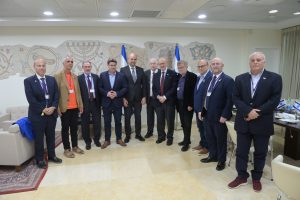 Tith Amir Ohana, chairman of the Knesset.
Tith Amir Ohana, chairman of the Knesset.
-Who are the members of this B’nai B’rith delegation?
-This is a delegation from the board of B’nai B’rith International. B’nai B’rith International, besides having national directors in the United States, also has directors in different areas of the world. For example, from Europe we had a delegate from Italy, we had a delegate from Poland… In the case of Latin America I was there for Panama and we had a representative from Uruguay. So we were a fairly representative delegation from around the world.
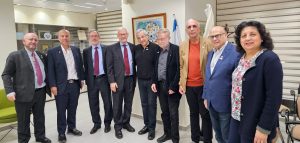 With the president of the B’nai B’rith Israel, Emanuel Cohen.
With the president of the B’nai B’rith Israel, Emanuel Cohen.
-For an organization of so many years, an organization really so consistent in the history of the world, could you imagine an organization that has to witness a moment like the one you are going through?
-This year B’nai B’rith celebrates 180 years since its foundation, which is an important number. At the same time, it is the 75th anniversary of the State of Israel, which is also an important number. I think this trip we have made was very important to say that we are here, that we support the State of Israel not only with money, because we have contributed several hundreds of thousands (of dollars) for the welfare of the soldiers, the families of the fallen, of the kidnapped… But also to give emotional support. I think it is very important to be able to tell people «here we are» and give them a hug.
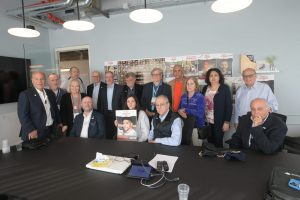 At the office off the Forum of Families of the Kidnapped and Disappeared.
At the office off the Forum of Families of the Kidnapped and Disappeared.
-This is in B’nai B’rith’s DNA. The organization is always seen presenting itself in any conflict of anti-Semitism, conflicts in the world.
-Yes, there are three fundamental pillars. One is philanthropy, the other is the fight against anti-Semitism and the other is support for the State of Israel. I think those three pillars are all coming together at the moment.
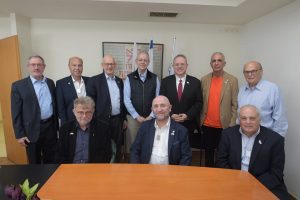 With Yaakov Hagoel, president of the World Zionist Organisation.
With Yaakov Hagoel, president of the World Zionist Organisation.
-You had a meeting with Yaakov Hagoel, someone who has responsibility in the Jewish world and is a great referent in the fight against anti-Semitism. What happened in that meeting?
-We were analyzing anti-Semitism in the United States, which is very strong now, especially on university campuses, and in Europe, which is also very strong. And the conclusion of the meeting is that they are expecting over 100,000 people to make aliá in 2024.
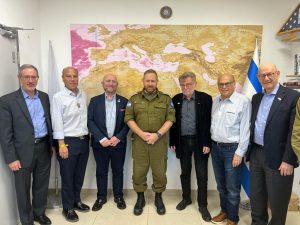 With Col. Lerner, IDF spokesman.
With Col. Lerner, IDF spokesman.
-Regarding the Foreign Ministry or protocol meetings, anything to share?
-Yesterday morning we were with four important ambassadors: the one who oversees the whole area of Europe, the one who oversees the whole area of Latin America and the one who sees the part of the United States. They each gave their analysis of the current war situation and how it is affecting each of their areas.
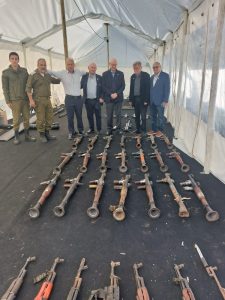 At the Hamas Weapons Collection Center at Camp Sarafand.
At the Hamas Weapons Collection Center at Camp Sarafand.
-What do you take away from this trip and how do you think this affects each continent or each area?
-What I take away from the trip is that Israel is going to do what it has to do, no matter what the opinion of the world is. Because the opinion of the world will not defend us and will not preserve the life of the state. Today was very strong: we visited Kibbutz Kfar Aza, Beeri (main photo) and Sderot. And whatever has to be done, despite the ceasefire pressures, has to be done. Israel has to move forward with its goal of victory, which is to eradicate Hamas, both militarily and its ability to govern. There is total determination on the part of all of Israel’s institutions to work toward that.
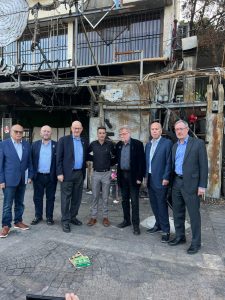 With the mayor of Kiriat Shmona, Avichai Stern.
With the mayor of Kiriat Shmona, Avichai Stern.
-B’nai B’rith has the sensitivity to be able to observe the societies of the world. This has been true for 180 years. How did you see Israeli society?
-It’s a very hurting society. Everyone here has someone who died, has someone who got hurt or has someone who is in the army right now. The country is in a state of shock, still not recovering from what happened 75 days ago. But at the same time there is a lot of determination and a lot of unity. Obviously that division that there was over the judicial reform completely disappeared in one day. It went from a country divided 50-50 to a country 100% united for a cause. That is impressive.
-It’s a pity the cost was so important.
-It is a pity that something like this had to happen, but that is the result and that is what we have.
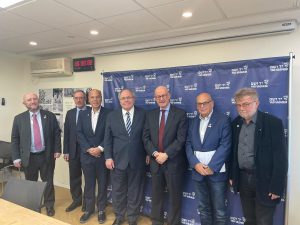 With Danny Dayan, President of Yad Vashem.
With Danny Dayan, President of Yad Vashem.
-I have been able to see a photo of a visit to Yad Vashem and they have met with their main referent who is Danny Dayan. They are two institutions united by a common theme. What did you take from there?
-Yes, basically again the analysis of the war, of how the country is. But what I found very interesting is that Yad Vashem has always been a center for historical studies of the Shoah and even there. They don’t go into issues of modern anti-Semitism. And they are thinking very strongly about going into that area and start working to attack the problem of anti-Semitism.
 At the B’nai B’rith Collection Center.
At the B’nai B’rith Collection Center.
-What is your view as a member of B’nai B’rith from Latin America?
-I have no doubt that Israel will be victorious in this war and will come out stronger. It is going to be a deterrent to the other enemies of the State of Israel, whether they are Iran, Hezbollah or the Houthis. They are going to see what happens to those who interfere with us and that is why I believe that in the end Israel will come out stronger.
-What is the message to the region regarding the situation?
-The message to the region is that we have to remain united because that is the only thing that will allow us to move forward as a people and as a nation. We no longer want to see society divided over political issues, but for the identity of our people and for the State of Israel there must be unity.
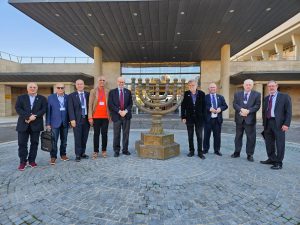
-What is the message to non-Jewish leaders in the region?
-Especially to the democracies: let them all know that this is the time to support the only democracy in the Middle East because if you don’t defend the way of life of a democratic country, all the other democratic countries are in danger of the same thing happening to them. If Hamas had been victorious in what they did, believe me they are still for Europe and they are still against the Arab monarchies in the region, because they would continue until they form their caliphate. So it’s important for everyone to support what Israel is doing now.
The solidarity mission
“This was a solidarity mission like no other in which I have participated,” Mariaschin said. “The unprecedented assault on Israelis on October 7th was also an assault on the entirety of the Jewish people. Going forward, we must dedicate ourselves to cooperation between diaspora communities and Israel in a way never before experienced. B’nai B’rith International pledges to be in the frontline of that cooperation.”
The mission’s intensive itinerary included a visit to the “Nova 6:29” exhibition at the Tel Aviv Expo, created in memory of those murdered at the Nova music festival on Oct. 7, where the group was accompanied by survivor Omri Sasi, a producer of the festival, and B’nai B’rith member Ofer Lior, father of victim Matan Lior who was the festival’s sound engineer.
The mission also visited a chilling IDF exhibition of captured Hamas vehicles and weapons used in its murderous attack against Israel. In the northern city of Kiryat Shmona that is targeted three to four times daily by Hezbollah, the group was briefed by mayor Avichai Stern and viewed rocket damage caused earlier in the week.
In the South, the group visited Sderot, a city that suffered over 50 civilians and 20 security forces casualties. They were briefed at the city’s command and control center and visited the police station that dozens of terrorists had captured and subsequently destroyed.
Facilitated by the Army Spokesman’s Office, the group was briefed by IDF officers at kibbutz Kfar Aza, a community that suffered 63 casualties, 18 kidnapped and one unaccounted for. They also visited kibbutz Be’eri, where member Avner Gat described the harrowing events surrounding the murder and kidnapping of family members among the 93 murdered and eight kidnapped on his kibbutz. Here, the group interacted with IDF soldiers who had just exited Gaza for a brief break at a volunteer-run canteen.
At the Hostages and Missing Families Forum in Tel Aviv, the mission was briefed by Ambassador (ret.) Baruch Bina and other members of the Forum’s diplomatic team and heard an appeal from a relative of hostage Evyatar David, who remains in Hamas captivity. They also visited “Hostages Square,” a focal point for activism on behalf of the more than 100 remaining hostages.
Over the course of the mission, the group was briefed on current developments concerning the Oct. 7 attack and the ensuing war by:
Maj. Gen. (res.) Yaakov Amidror, former director of Intelligence Analysis in the IDF Intelligence Branch, former National Security advisor and head of the National Security Council
Yaakov Hagoel, chairman of the World Zionist Organization
Ofir Akunis, minister of Innovation, Science and Technology
Amir Ohana, Knesset speaker
Dr. Cochav Elkayam-Levy, Department of International Relations, Hebrew University, Founding head of the Deborah Institute for Gender and Sustainability Studies, and founder of Israel’s Civil Commission on October 7 Crimes by Hamas Against Women and Children
Lt. Col. (res.) Peter Lerner, IDF spokesman for Foreign Media
Ron Dermer, minister of Strategic Affairs and member of the war cabinet
Amb. Emmanuel Nahshon, deputy director general for Media and Public Affairs, Israel Ministry of Foreign Affairs (MFA)
Amb. Shuli Davidovich, head, World Jewish Affairs and World Religions Division, MFA
Hamutal Rogel Fuchs, director, Jewish Communities Department, MFA
Amb. Amir Weissbrod, deputy director general, U.N. and International Organizations Division, MFA
Amb. Jonathan Peled, deputy director general, Latin America Division, MFA
Dani Dayan, chairman, Yad Vashem Directorate
Stephanie Hallett, deputy chief of Mission, U.S. embassy, Jerusalem
The B’nai B’rith mission participants brought military-grade backpacks and packed gear—purchased with an allocation from B’nai B’rith’s Israel Emergency Fund—and presented it to IDF soldiers at a volunteer logistical center established by attorney Yifat Amit and supported by B’nai B’rith Israel. They also held a meeting with B’nai B’rith Israel President Mano (Emanuel) Cohen and Ilan Shcori, both of whom are responsible for international relations at B’nai B’rith Israel.
The mission ended in the Bedouin city of Hura, where a condolence visit was made to the family of Samer al-Talalka—one of three Israeli hostages accidentally killed by IDF soldiers. Samer’s father, Fuad, was hosted by B’nai B’rith at a conference in Paris on Dec. 13 that highlighted the ongoing humanitarian consequences of Hamas’ atrocities in Israel.


